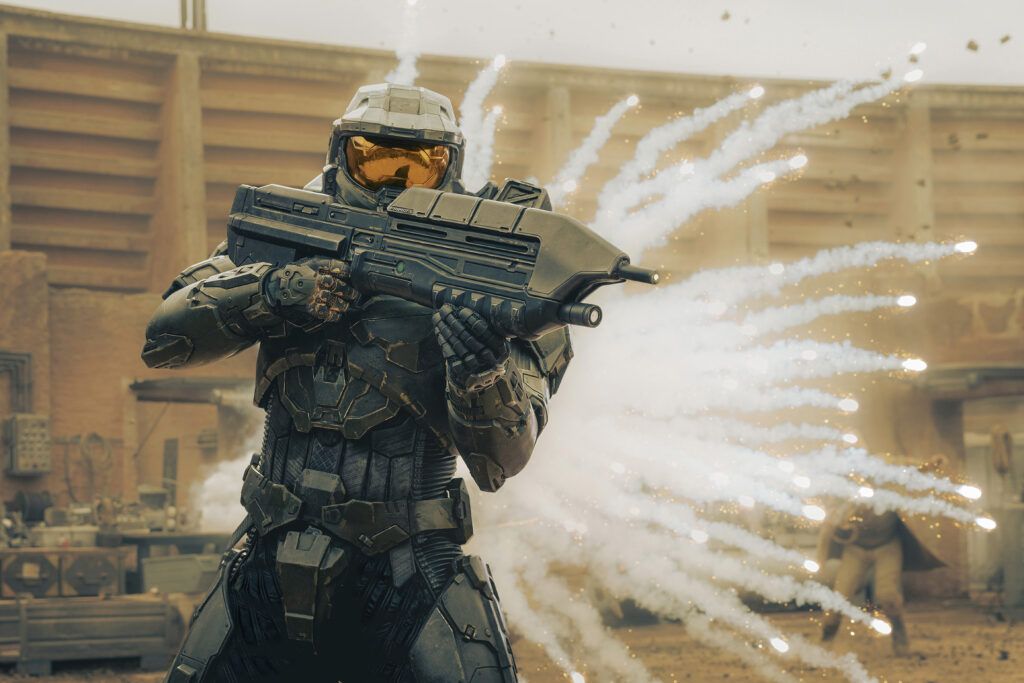
When it comes to adapting one of the biggest video game franchises in the world, the question of whether it’s good has to coincide with the question of whether it should exist at all.
电视改编的“光环”——首映Thursday, March 24, on Paramount+, produced by Amblin and developed by Kyle Killen and Steven Kane — is based on the hit video game but is not part of its established canon. Instead, it’s a condensation of the lore-heavy universe into a manageable television space opera.
The show follows Master Chief John-117 (Pablo Schreiber), a giant, genetically engineered super soldier who works for the imperial and vaguely fascist United Nations Space Command in the 26th century. A civil war is under way among the various colonies in this universe, and a confederation of alien races called the Covenant have begun attacking outposts while on the hunt for ancient artifacts they believe will lead them to heaven.
The first episode opens with one of these attacks. The human rebels at the outposts are a ragtag group who hate the space marines and Spartans, like Master Chief. When Covenant forces arrive, they are brutally slaughtered by the superior technology of the aliens, even after Master Chief arrives to help. The only survivor is Kwan Ha (Yerin Ha), whom Chief takes along with him on what turns out to be a journey of self-discovery.

The comparisons to“The Mandalorian”are inescapable. Both feature battle-scarred warriors connecting with a young ward while hopping through adventures in the galaxy. It’s a very different dynamic from the game, where most of the narrative and characterization comes between the stoic chief and his artificial intelligence guide Cortana.
And while “Halo” does stand as a better outright space story than the borrowed samurai trappings of “The Mandalorian,” the series takes itself a bit too seriously to be as enjoyable as the Disney+ show. This has always been the problem with “Halo,” which is why the bizarre and ridiculous parody web series “Red vs. Blue” worked so well.
Ideally, adapting work from one medium to another should allow for the project to expand beyond the capabilities of the original, and that’s what makes “Halo” so strange. While the action sequences are not bad, they also aren’t any better than things seen in the actual games. Aliens like the reptilian Sangheili look great, but why wouldn’t they? Game developer 343 Industries is partially producing this series, and it has had years to learn how to make CGI baddies reach their full onscreen potential.

If anything, the human actors look out of place. Grand as these scenes are, they are just not as visually or emotionally exciting as the latest “Halo” game. When shots turn first-person, all it does is remind someone they could be playing something as good or better than this instead.
The biggest problem is Master Chief. Like Super Mario, this is a character defined mostly through how players navigate him in a digital space. Add in “Halo’s” long history as a multiplayer haven (“Halo 3” ran its servers for 14 years, only shutting down in 2021), and most of the great stories in the series happen because players make them happen within the game. It’s the reason a “Fortnite” series would never work, and why “Team Fortress” stuck to humorous short films.
Schreiber certainly gives Chief a soul, even if his interactions with Kwan feel like Paramount+ just wants to get out a story with this dynamic before HBO releases its adaptation of “The Last of Us.”
“Halo” may be a perfectly competent action story in space, but it feels like a lesser version of things that have come before, including its own source material.
L“Halo”:Starring Pablo Schreiber, Natascha McElhone, Yerin Ha and Charlie Murphy. Developed by Kyle Killen and Steven Kane. (TV-MA. Nine episodes at approximately 60 minutes each.) Premieres Thursday, March 24 on Paramount+. Subsequent episodes released Thursdays through May 19.
